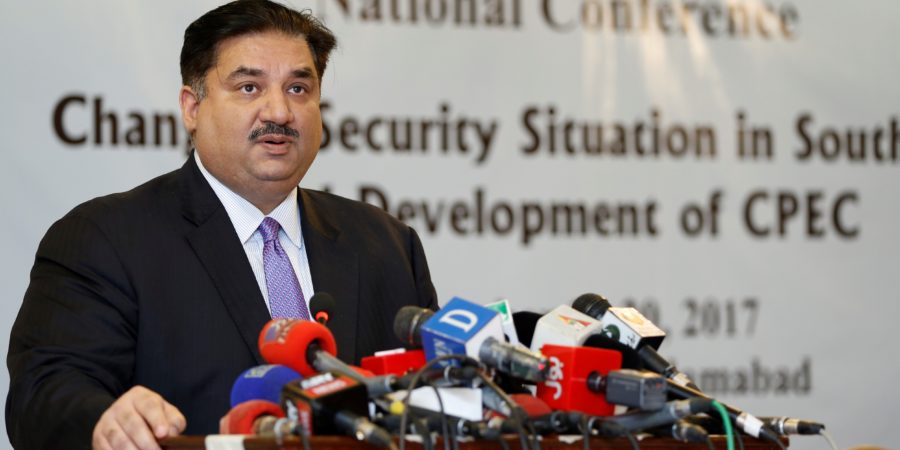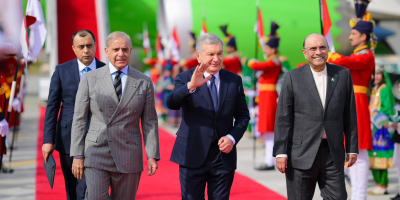Changing Security Situation in South Asia and Development of CPEC

ISLAMABAD, SEPT 20 (DNA) – ‘In the South Asia security matrix, there is no room for the self-proclaimed and artificially boosted states.’ This was stated by the Federal Minister for Defence Engr Khurram Dastgir Khan in the concluding session of the Two-Day National Conference ‘Changing Security Situation in South Asia and Development of CPEC’ organised by the Islamabad Policy Research Institute and the Hanns Seidel Foundation in Islamabad today.
Speaking to a packed hall, he said that the recently announced US policy on South Asia underscores a greater role for India in Afghanistan and the region, while not acknowledging the exponential contribution, counterterrorism success, and sacrifices of Pakistan for peace and regional stability.
‘There are strategic contradictions in the US approach, and most key regional and global players have not supported this declared US policy since it envisages India to be a Net Security Provider in the region. In the South Asia’s security matrix, there is no room for the self-proclaimed and the artificially boosted states. Regional security in the 21 st Century can only be ensured through relationships and collaborations based on mutual trust and equality,’ he underscored.
The Minister said that South Asia is undergoing an unprecedented transformation due to globalized economic trends and rising interdependencies, wherein the prosperity and stability of one nation will be indivisible from others. ‘It is home to countries that share much with each other culturally and geographically, but ironically progressing independently rather than in conjunction’, he said. The possible reasons for limited cooperation lies in deep rooted historic political differences due to colonial legacies and territorial disputes which have not allowed the environment of trust to prevail and is being exploited by the extra regional states for their geopolitical interests. Consequently, political issues and conflicts have not allowed the strategic and economic interests of the region to take precedence. Amidst these complex security threats, China Pakistan Economic Corridor as part of Belt and Road Initiative (BRI) is a significant flagship project which has gained global attention and has the potential to bring a paradigm shift in the destiny of this entire region. ‘But here the caveat is that peace amongst the regional countries is a pre-requisite for success of this initiative.’ While Pakistan has demonstrated its keen and sincere endeavors to resolve the issue of Kashmir through dialogue in lines with the UN Security Council Resolutions, India has always been shying away from the talks, on one pretext or the other where its new generations continue to carry the banner of Azadi.
‘the success of CPEC hinges on our ability to deal with intricate national security issues, forging national consensus and preventing negative geo-political influences in the region. Cooperation between Pakistan and China is focused on economic development through connectivity and is not.
against any other country and seeks to establish and sustain long-lasting and mutually beneficial relationships with the global and regional players,’ he concluded.
There was unanimous agreement by the conference delegates that China has never changed its stance towards Pakistan and remains steadfast in supporting the country at the international level, China’s push to block anti-Pakistan statements in the recent BRICS Declaration is one example of that. It was pointed that the China Pakistan Economic Corridor (CPEC) is offering a development counter-narrative to Balochistan’s grievances, and the Government of Pakistan (GoP) should involve the local people and engage the country’s young men and women in CPEC projects, whether related to communication linkages and infrastructural development, in order to curb
extremism and bring disenfranchised youth into the mainstream. It is in the interest of SAARC to offer full membership to China to boost the process of regional cooperation, and create a strategic balance in South Asia to positively shape the present and future of the region, they recommended.
In the session on ‘Regional Security and CPEC’ chaired by Dr. Zafar Iqbal Cheema, President & Executive Director, Strategic Vision Institute (SVI), Dr. A. Z. Hilali, Chairman from the University of Peshawar provided a detailed overview of China’s economic development and said that CPEC is a recognition of Pakistan’s strategic location, but is also a ‘double-edged sword bringing both opportunity and a threat to its internal and external enemies.’ He informed the audience that majority of Afghan people and policymakers support CPEC, however, traditional communist elements and pro-India lobby are preventing Kabul from joining. Dr Hilali also said that through CPEC, Afghanistan will have the opportunity to stabilize its economy by enhancing its trade opportunities. He pointed out that Pakistan has constructed two roads leading from D.I.Khan to Angoor Adda and Ghulam Khan, linking with Paktika and Khost provinces of Afghanistan. He said that these roads will ‘enable Afghan business community and investors to access the enormous consumer markets in South Asia, thereby increasing the country’s exports and reducing the costs of imports.’ In the end, he cautioned that ‘operational and security risks in terms of geopolitics are present for CPEC and OBOR countries because the current world economy is still unstable, and changes in macro-economic industry and market environment will have an impact on cross-border investment.’
Professor Dr. Moonis Ahmar, Meritorious Professor from the University of Karachi discussed his paper on ‘Development of CPEC: Impact of Regional Cooperation to End Extremism in the Region’. He said that engaging youth in projects covered under CPEC particularly roads, railways, solar and thermal power production will not only enhance their talent and skills, but will also utilize their energies in a positive manner. Given the growing ‘youth bulge’ in Pakistan, its involvement in CPEC-related projects may help dilute their frustrations, mitigating the threat of extremism in the country. He recommended that the GoP should promote massive economic activities and developmental projects so that those who are unemployed or idle are engaged. He also called on members of the South Asian Association for Regional Cooperation (SAARC) and Economic Cooperation Organization (ECO) to invite China to become a full member.
Dr Khurram Iqbal from the National Defence University in his presentation pointed out that India’s response to CPEC has barred the potential of this mega developmental initiative to address regional political faultlines by ‘transforming ideological terrorism into Cold War era proxyism.’ He opined that at the global level, America’s response to CPEC is difficult to read, while the Corridor has made Russia’s access to Warm Waters possible. Within South Asia, Afghanistan is a reluctant supporter of CPEC given its own internal economic imperatives; whereas Bangladesh is playing both sides with Maldives and Nepal supporting the project enthusiastically. He highlighted that India misperceives CPEC because it fears that Pakistan may convert her newly acquired wealth into military muscle and obstruct India’s rise. He pointed out that ‘increased Chinese economic stakes in the region have the potential to internationalize the Kashmir dispute,’ and recommended that there should be a joint Sino-Pak stance on issues related to the use of proxy groups by India and greater Chinese support for a multilateral approach to Kashmir.
Discussing ‘CPEC’s Impact on Pakistan-Iran Security and Trade Relations’, Dr. Muhammad Alam Khan from the University of Balochistan said that Pakistan and Iran have their own security priorities in South Asia and the Middle East. Pakistan has specific security policy for India, whereas Iran feels threatened by Israel and the US. He opined that the visit of Iranian President Rouhani to Pakistan recently and his desire to focus on Gwadar-Chabahar ports connectivity is an early sign that the government in Iran is focused on positive sum game instead of zero-sum game against each other. He stressed that Pakistan should invite Iran to join CPEC to minimize the influence of India in the region, especially in Balochistan province, in addition to providing a direct link between China and Iran. ‘The benefits from CPEC must be distributed according to an agreed formula based on people-centric approach to satisfy all stakeholders of the country’, he concluded.
‘India has rejected OBOR and CPEC to stop China from creating its own sphere of influence because it feels threatened by the latter’s expansion and so has started its own parallel processes, according to Dr Muhammad Mujeeb Afzal from Quaid-i- Azam University. India is a status inconsistent state because in South Asia, it is perceived as a regional hegemon, while globally it wants to present a docile strategic posture through its soft diplomacy. He said that at the international level, India is pushing its non-violence and neutrality propaganda, while at the regional level, it is the polar opposite, using coercion and intervention over its smaller neighbours. He said that India has managed to develop concert with the United States in order to create hurdles for Pakistan given its relationship with China and the rapid development of CPEC.
In his vote of thanks, Ambassador (R) Abdul Basit, President of IPRI thanked the participants, media and the delegates for making the conference a success. He appreciated China’s diplomatic support by acknowledging Pakistan as a country on the front lines in the struggle against terrorism and its great sacrifices and contributions in trying to make the region a haven ofstability and sustainable development.
Related News

Uzbek President Mirziyoyev in Islamabad for a two-day state visit
Asnar M Bhatti ISLAMABAD, President of the Republic of Uzbekistan Shavkat Mirziyoyev on Thursday arrivedRead More

British High Commission celebrates Scottish-Pakistani ties at ‘Caledonian Ball’ in Lahore
ISLAMABAD, FEB 5 /DNA/: Held at the historic Sir Ganga Ram Residence, Wednesday’s Caledonian BallRead More


Comments are Closed